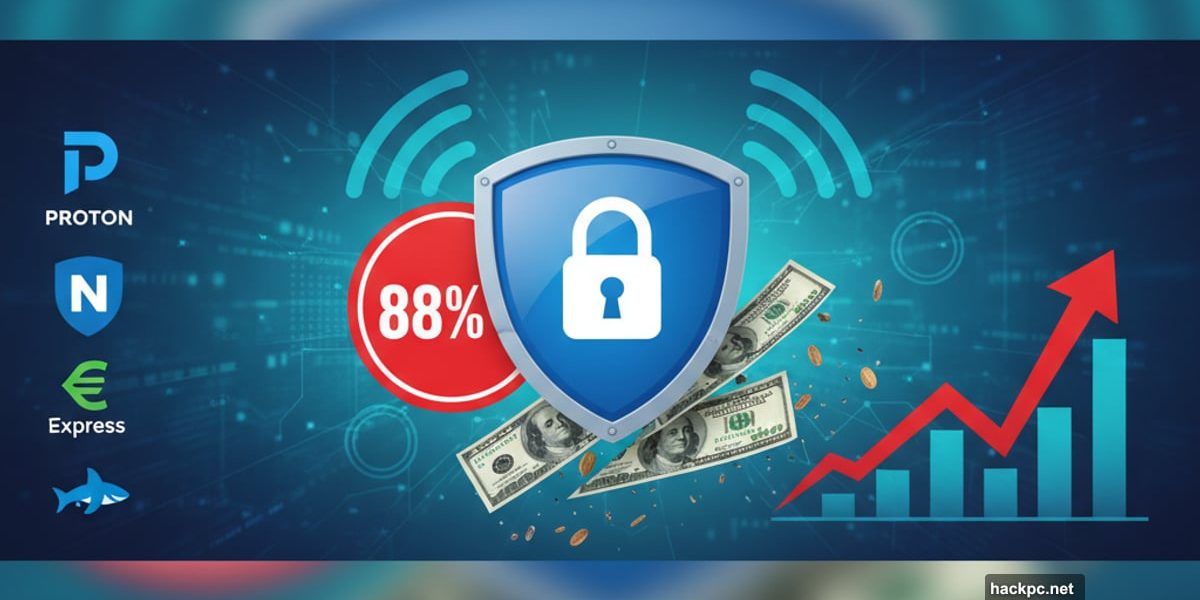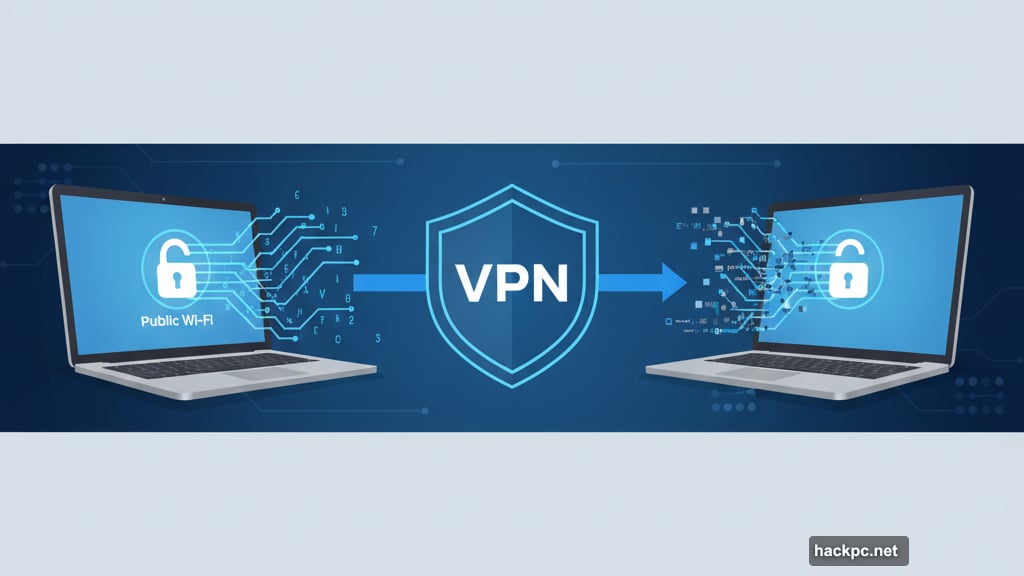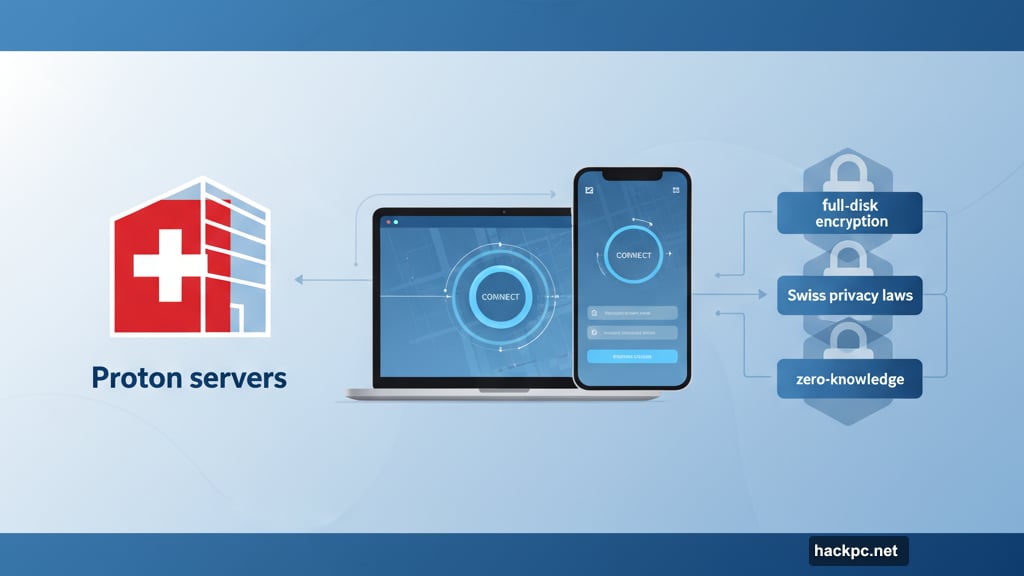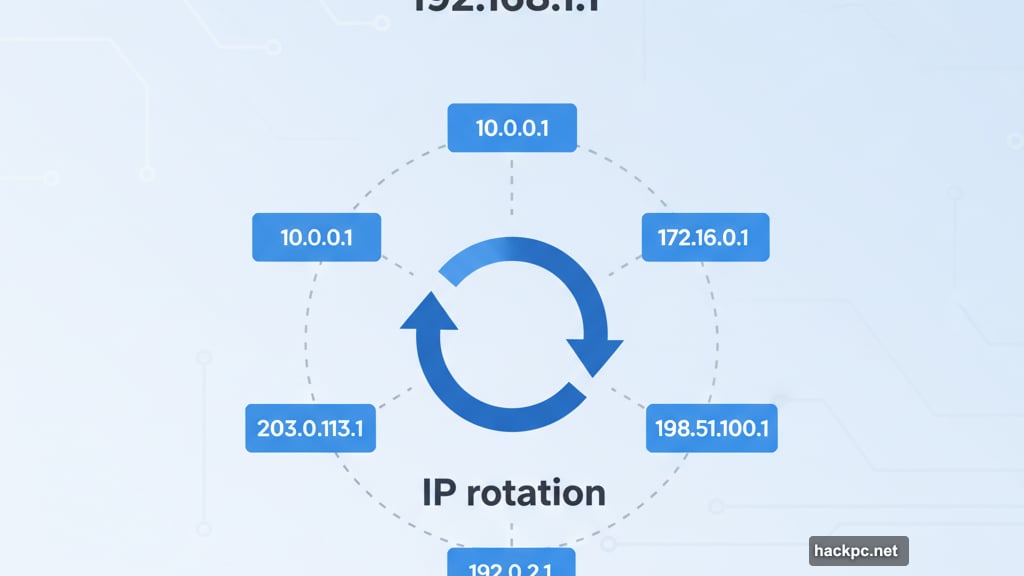
VPN pricing feels like a shell game. Providers advertise “huge savings” that turn out to be smoke and mirrors. Meanwhile, your data sits exposed on public Wi-Fi networks.
But right now? Several top VPNs slashed prices to genuinely useful levels. We’re talking 73 to 88 percent off legitimate services that actually protect your privacy. Plus, these aren’t the usual marketing tricks—the math checks out.
Let’s break down which deals deliver real value and which ones hide gotchas in the fine print.
Proton VPN Leads the Pack at Half Price
Proton VPN sits at the top of our rankings for good reason. It combines Swiss privacy laws with full-disk encryption that keeps your browsing invisible even to Proton itself.
Right now, you can grab 24 months for $119.76. That’s 50 percent off and works out to $5 per month. Not the deepest discount on this list, but it’s the best service.
The interface feels polished on every platform. So whether you’re using Windows, Mac, iOS or Android, the experience stays consistent. That matters in multi-device households where everyone needs protection.
Moreover, Proton maintains fast speeds even across long distances. My testing showed minimal slowdown—usually under 10 percent—which makes streaming smooth and downloads quick.
NordVPN Cuts 74 Percent With Free Months Added
NordVPN nails the essentials. Fast connections. No data leaks. Reliable location changing. Plus, it connects instantly and includes live support that actually helps.
The Basic plan costs $80.73 for two years with three bonus months. That’s 74 percent off regular pricing. For that money, you get solid VPN protection without extras.

However, the Plus plan deserves attention at $105.03 for the same period. For about $25 more, you gain ad blocking, malware protection and the NordPass password manager. Plus, it adds dark web monitoring that alerts you when your data shows up in breaches.
One disappointment—NordVPN recently shut down Meshnet. But it still offers unique features like instant Tor connections through dedicated servers.
ExpressVPN Finally Offers Real Savings
ExpressVPN typically costs too much. But at 73 percent off, the math changes.
Pay $97.72 for 28 months and you get arguably the easiest VPN to use. The apps work flawlessly across all platforms. In testing, speeds dropped less than 7 percent. Location changes succeeded 14 out of 15 times.
That consistency matters. Many VPNs work great on desktop but stumble on mobile. ExpressVPN maintains quality everywhere.
The Advanced tier costs $125.72 for 28 months at 67 percent off. You gain 12 simultaneous connections instead of 8, the ExpressVPN Keys password manager, enhanced ad blocking, identity protection and half off an AirCove router.
Surfshark Pushes Innovation at 87 Percent Off
Surfshark does things other VPNs won’t attempt. It rotates your IP address constantly to avoid detection. You can choose entry and exit nodes for double-hop connections. Plus, speeds barely suffer despite these advanced features.
The Starter plan costs $53.73 for 27 months—87 percent off. That includes the complete VPN with all its cutting-edge capabilities.
Surfshark One bumps the price to $59.13 for 27 months at 88 percent off. You add antivirus scanning, data breach alerts, private search and identity tools. That’s the deepest discount on this list and packs serious value.

Skip Surfshark One+ though. Adding Incogni data removal jumps the price enough to kill the value proposition.
CyberGhost Automates Everything You Hate
Setting up VPN rules usually requires digging through menus. CyberGhost makes it simple with Smart Rules.
Tell it how to respond to different Wi-Fi networks. Auto-connect at coffee shops. Disconnect at home. Ask permission on unfamiliar networks. You can even set exceptions for specific networks by name.
The streaming servers deserve mention too. While CyberGhost doesn’t explain their optimization, I consistently get better video quality and fewer blocks when using them.
Currently 26 months costs $56.94—83 percent off. That’s solid value for this level of automation.
Private Internet Access Hits Rock Bottom
This deal takes some hunting to find, but it’s worth it. Three years plus three bonus months costs just $79. That’s 39 months at roughly $2 per month—83 percent off monthly pricing.
Despite the low cost, PIA includes DNS servers, ad blocking and automation features rivaling CyberGhost. The main drawback? Internet speeds can fluctuate unpredictably while connected.
Still, at this price point, it’s hard to complain. You’re paying less than a coffee per month for solid privacy protection.
Hidden Costs You Need to Know

Here’s where VPN deals get tricky. These promotional rates only apply to your first subscription period.
When renewal time comes, you typically can’t get the extra bonus months again. Worse, you often can’t renew for the same length—a two-year intro deal might force you into one-year renewals at higher monthly rates.
Check the fine print before committing. Calculate what you’ll actually pay over three or four years, not just the initial period. That $2 monthly rate might jump to $11 at renewal.
Also watch for automatic renewals. Most VPNs enable them by default. Set a calendar reminder a week before your subscription ends so you can evaluate whether to continue.
Free VPN Options Exist
Not ready to commit to a paid subscription? Hide.me offers the best free VPN available right now.
It outperforms competitors like EventVPN and even Proton VPN’s free tier. The apps feel polished and the server network rivals paid services. Honestly, hide.me charges too little for what it offers.
If you do want to upgrade, hide.me’s two-year plan costs $69.95 with two free months—73 percent off. That’s fair pricing for excellent no-frills protection.
Student Discounts and Seasonal Sales
Beyond these year-round deals, watch for extra savings. Many VPNs offer student discounts around back-to-school season. Holiday sales sometimes stack additional months onto existing promotions.
Proton VPN occasionally runs exclusive coupons through tech publications. These rarely advertise loudly, so checking directly with VPN websites pays off.

One provider bucks the discount trend entirely. Mullvad charges €5 monthly with no variations. Ever. It’s the Costco hot dog of VPNs—reliable, consistent and refreshingly straightforward.
The Math That Actually Matters
VPN deals only work if you’ll use the service for the full subscription period. Paying $120 upfront feels cheap monthly. But if you cancel after six months, you’ve wasted money.
Consider your actual needs. Do you travel frequently? Work from coffee shops? Stream foreign content regularly? If yes, a long-term VPN subscription makes sense.
If you need privacy protection occasionally—say, for one vacation per year—monthly subscriptions or even free options serve better despite higher per-month costs.
The biggest trap? Paying for features you won’t use. Password managers, ad blockers and identity monitoring sound great. But if you already use dedicated tools for these, you’re paying twice.
My Take on Which Deal Wins
Proton VPN at 50 percent off gives you the best service for the money. Yes, deeper discounts exist. But none combine privacy, speed and user experience as well.
For budget-conscious users, Surfshark One at 88 percent off delivers ridiculous value. You get top-tier VPN service plus security tools that would cost $100 yearly purchased separately.
ExpressVPN’s 73 percent discount finally makes it competitive. If ease of use matters more than saving every dollar, it’s worth the premium.
The real question isn’t which discount looks biggest. It’s which VPN you’ll actually keep using after the honeymoon period ends. Choose based on features you need, not just the percentage off.



Comments (0)